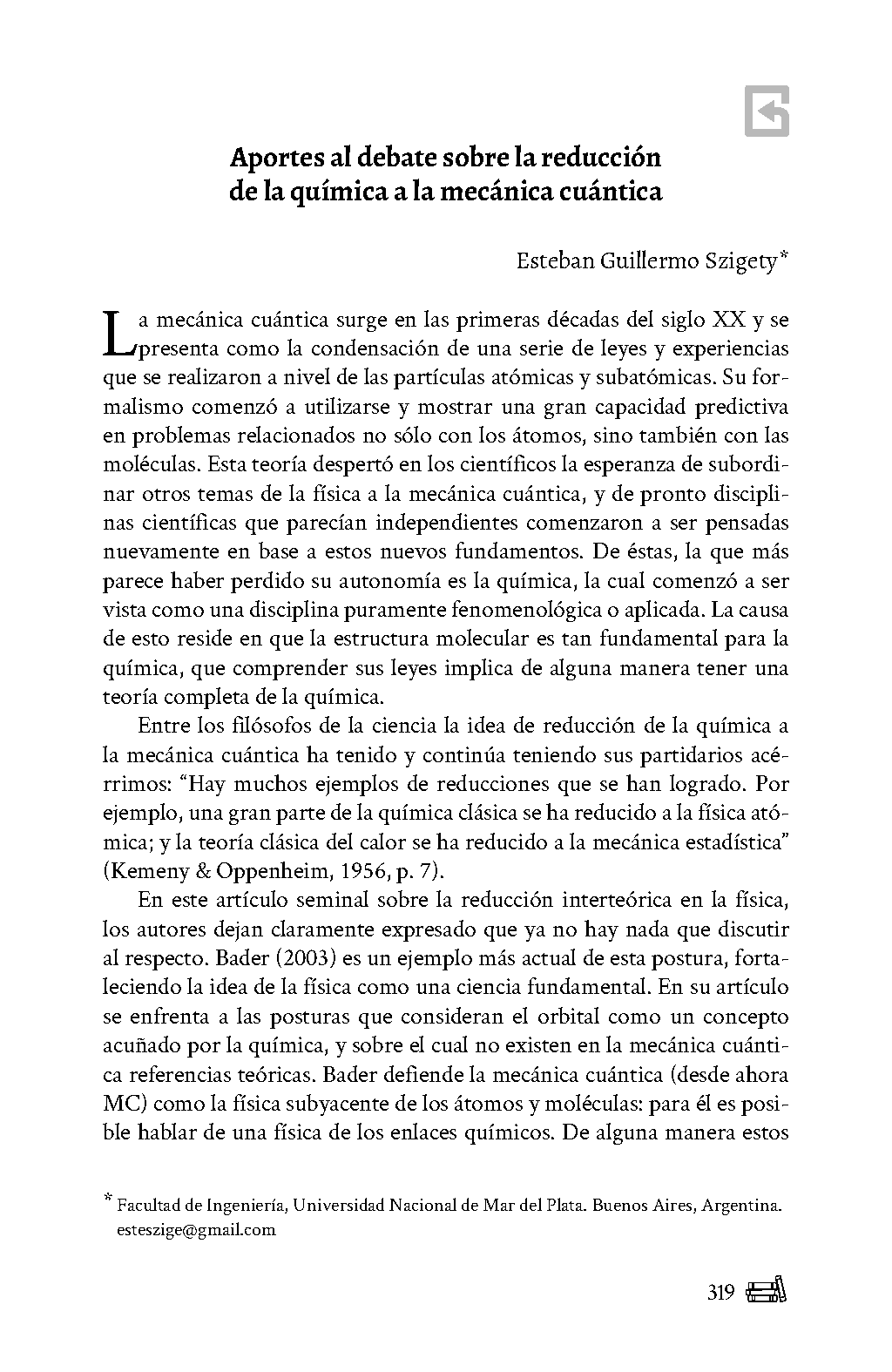Aportes al debate sobre la reducción de la química a la mecánica cuántica
Contenido principal del artículo
Resumen
El objetivo de este trabajo se centra en presentar las posturas principales sobre el reduccionismo de la química a la mecánica cuántica. Se analizan los puntos en común y diferencias de dichas posturas, aportando perspectivas personales en los distintos ítems del debate.
Detalles del artículo

Esta obra está bajo una licencia internacional Creative Commons Atribución-NoComercial-SinDerivadas 4.0.
- Los autores/as conservarán sus derechos de autor y garantizarán a la revista el derecho de primera publicación de su obra, el cual estará simultáneamente sujeto a la Licencia de reconocimiento de Creative Commons que permite a terceros compartir la obra, siempre que se indique su autor y su primera publicación en esta revista.
- Los autores/as podrán adoptar otros acuerdos de licencia no exclusiva de distribución de la versión de la obra publicada (p. ej.: depositarla en un archivo digital institucional o publicarla en un volumen monográfico), siempre que se indique la publicación inicial en esta revista.
- Se permite y recomienda a los autores/as difundir su obra a través de Internet (p. ej.: en archivos digitales institucionales o en su página web) antes y durante el proceso de envío.
Cómo citar
Referencias
Bader, R. F. W. (2003). Letter to the editor: Quantum mechanics, or orbitals? International Journal of Quantum Chemistry, 94(3), 173-177.
Bunge, M. (1982). Is chemistry a branch of physics? Zeitschrift für allgemeine Wissenschaftstheorie, 13(2), 209-223.
Bunge, M. (2003). Emergence and convergence: Qualitative novelty and the unity of knowledge. Toronto: University of Toronto Press.
Fodor, J. A. (1974). Special sciences: Or the disunity of science as a working hypothesis. Synthese, 28, 97-115.
Fortin, S., & González, J. C. M. (2013). La relación entre química y física: Isomerismo óptico y la paradoja de Hund. Revista Colombiana de Filosofía de la Ciencia, 13(26), 199-224.
Hendry, R. F. (2006). Is there downward causation in chemistry? En En D. Baird, E. Scerri, & L. McIntyre (Eds.), Philosophy of chemistry: Synthesis of a new discipline (pp. 173-189). Dordrecht: Springer.
Kemeny, J. G. & Oppenheim, P. (1956). On reduction. Philosophical Studies: An International Journal for Philosophy in the Analytic Tradition, 7(1-2), 6-19.
Kim, J. (1998). Mind in a physical world: An essay on the mind-body problem and mental causation. Cambridge: MIT Press & Bradford Books.
Laughlin, R. B., & Pines, D. (2000). The theory of everything. Proceedings of the National Academy of Sciences of the United States of America, 97(1), 28-31.
Nagel, E. (1961). The structure of science. London: Routledge & Kegan Paul
.
Primas, H. (1981). Chemistry, quantum mechanics and reductionism: Perspec- tives in theoretical chemistry. New York: Springer-Verlag.
Scerri, E. R. & McIntyre, L. (1997). The case for the philosophy of chem- istry. Synthese, 111(3), 213-232.
Scerri, E. (2000). Have orbitals really been observed? Journal of Chemical
Education, 77(11), 1492-1494.
Weisberg, M., Needham, P., & Hendry, R. (2019). Philosophy of chemistry. En E. Zalta, The Stanford encyclopedia of philosophy (Spring 2019 Edition). Recuperado de https://plato.stanford.edu/ar- chives/spr2019/entries/chemistry/.
Woolley, R. G. (1978). Must a molecule have a shape? Journal of the American Chemical Society, 100(4), 1073-1078.

